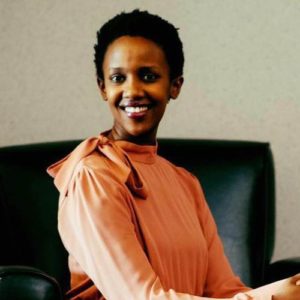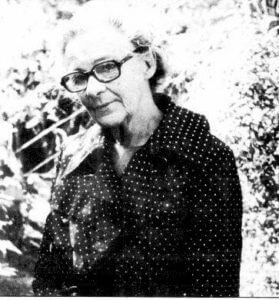In celebration of our 100th Inspiring Thursday post, we are highlighting some of the leaders taking action to combat sexual and gender-based violence across the globe. They range from activists, founders of NGOs, artists and more, but they are all contributing to bringing attention to and challenging violence against women. We have highlighted one individual from each continent, apart from Antarctica, and added a few “honorable mentions” to give you an inspiration overload!
AFRICA
Tabitha Mpamira-Kaguri (Rwanda/Uganda), founder of the EDJA Foundation

Tabitha founded EDJA in 2015 to combat child abuse, sexual assault and domestic violence in sub-Saharan Africa. Tabitha was inspired to start EDJA following the rape of a 9-year-old girl by a 35-year-old man, where adults around the girl knew of the rape but did not have the resources to help her. Tabitha was also motivated by her own experience of childhood sexual assault as an 11-year-old Rwandan refugee in Uganda. She named the organisation after her mother, Edith, and her mother-in-law, Judith.
EDJA provides support to women and girls ages 4 – 38 who have experienced sexual assault, offering free counselling, legal advocacy and medical services in two districts of southwest Uganda. It also economically empowers parents and guardians of victims and strives to educate the community, including police and health professionals, about eliminating existing stereotypes and stigmas surrounding sexual assault and violence. EDJA works in collaboration with the organisation Nyaka, sharing resources in order to be as effective as possible and to expand their reach.
See also:
- Marceline Kongolo-Bice (Democratic Republic of Congo), founder of the NGO SOS Femmes en Danger to help rape survivors and empower women living in the Fizi Territory.
- Legal Access Through Women Yearning for Equality Rights and Social Justice (LAWYERS) (Sierra Leone), an all-female legal group of about 50 women that offers pro bono work to women needing assistance with crimes related to sexual violence.
- Chouchou Namegabe (Democratic Republic of Congo), co-founder of the South Kivu Women’s Media Association, which uses the media to promote and protect women’s rights.
- Kakenya Ntaiya (Kenya), founded “Kakenya’s Dream” to provide education to girls, end harmful traditional practices and engage with the community.
- Amy Oyekunle (Nigeria), supports leadership by women and girls at the Kudirat Initiative for Democracy (KIND).
ASIA
Swati Chauhan (India), Magistrate who worked on the Immoral Trafficking Prevention Act

Swati is the magistrate of Mumbai’s specialized court cases for those cases falling under the ITPA. She was a particularly strong advocate for the protection of victims of sex trafficking. While the ITPA has existed since the 1950s, it has since been updated, and in 2008 a special court was established to handle cases falling under ITPA as there was a backlog of nearly 1,500 cases. Swati worked through the backlog from 2008-2011, issuing 1,200 rehabilitation orders and ensuring sex workers were not treated like criminals. The convictions she ruled against traffickers were key in demonstrating the value of having specialized anti-trafficking courts and were a model for the rest of the country, as well as other parts of the world.
Swati spoke and worked personally with victims and strove to increase sensitivity towards cases dealing with sexual violence within the legal system. Swati also held training courses to educate people, including police officers, on the best and most effective ways to implement ITPA.
See also:
Rita Chaikin (Israel), advocate for human trafficking victims with the Isha L’Isha-Haifa Feminist Center.
Sohini Chakraborty (India), founder and director of Kolkata Sanyed, which provides dance therapy for rehabilitation.
Sunitha Krishnan (India), co-founder of the NGO Prajwala (“eternal flame”) which rescues women from sex trafficking and brothels and educates their children.
Mukhtar Mai (Pakistan), fights for justice for survivors of rape and sexual assault.
Irina Matvienko (Uzbekistan), femiactivist, journalist and human rights defender.
AUSTRALIA
Bessie Guthrie (Australia), designer, publisher, feminist and campaigner for women’s rights

Bessie founded her own publishing company, Viking Press, in 1939, focusing mainly on poetry and anti-war tracts. She later worked in aircraft design for the government and organized a series of talks which aired on the radio called “Plans for Women in the Post-War World.” Later on, while working as a professor, she directly challenged and criticized the oppressiveness of housework as it related to gender roles and norms.
In the 1950s, Bessie began helping young women and girls who were victims of domestic abuse and violence, allowing them to stay in her home. In March 1974, after years of research and campaigning, Bessie helped open Elsie Women’s Refuge Night Shelter, the first women’s refuge shelter in Australia. She also helped shut down the Parramatta Girls Home and the Hay Institution for Girls.
See also:
Renate Klein (Australia), academic, writer, publisher and feminist health activist who co-founded the independent feminist publishing company Spinifex Press in 1991 and focuses on issues related to reproductive medicine, feminist ethics and women’s right to abortion.
Anastasia Powell (Australia), feminist criminologist focused on policy and prevention around men’s violence against women, especially sexual violence. She is a co-founder of VDAWnet.
Jocelynne Scutt (Australia), feminist lawyer, writer and commentator who was instrumental in reforming Australian laws concerning rape and domestic violence.
EUROPE
Jeanne Ponte (France), political advisor in European Parliament – #MeTooEP

While working as a parliamentary assistant to MEP Edouard Martin, Jeanne was the first aide to put her name forth amid allegations of sexual harassment within Parliament. Her actions opened the way for others to bring forth their own stories. Jeanne kept a notebook documenting testimonies of harassment occurring within European Parliament, and her revelations challenged institutional power structures and norms while drawing attention to issues of gender equality and women’s rights.
In March 2018, Jeanne began a movement made up of workers from various backgrounds at the European Parliament. The goal was to bring attention to the issue of sexual harassment and make it a key point in political campaigns. In collaboration with her co-workers, she launched a blog denouncing the sexual harassment taking place within European Parliament, which is titled “#MeTooEP”. Ponte and other European Parliament workers hoped to confront a “culture of rampant but invisible sexual harassment” within the institution. This work led to the passage of an anti-harassment resolution in Parliament, signed by over 1,000 people calling for its enforcement. The move also challenged existing structures and mechanisms within European Parliament to address sexual harassment, and the blog made sure to point out alternative resources for workers dealing with sexual harassment.
See also:
Oksana Horbunova (Ukraine), human rights activist who created the first Ukrainian counter-trafficking NGO and who coordinates with the International Organization for Migration to combat human trafficking.
Věra Jourová (Czech Republic), European Commissioner for Justice, Consumers and Gender Equality who has fought against sexual harassment and, when calling for others to get involved in the #MeToo movement, revealed that she was a survivor of sexual violence.
Cecilia Malmström (Sweden), European Commissioner for Trade and anti-harassment advocate who has made a point to call men to action.
Vicky Simister (United Kingdom), founded the Anti-Street Harassment Campaign in order to bring the issue to public attention.
NORTH AMERICA
Sarah Deer (Muscogee [Creek]), lawyer, professor, advocate

Sarah focuses on victims’ rights and the prevention of sexual and domestic violence for Native American women. More specifically, she examines the intersection between federal Indian law and victims’ rights, and her work on this subject has won various accolades. She was instrumental in securing both the Tribal Law and Order Act of 2010 and the 2013 reauthorization of the Violence Against Women Act. In the case of the latter, tribal governments and courts were restored some of the power they had previously held to prosecute non-Native Americans who assault Native spouses/partners or who violate a protection order while on tribal lands.
See also:
Norma Andrade and Marisela Ortiz (Mexico), co-founders of “Nuestras Hijas de Regreso a Casa”, an anti-femicide organisation.
Macedonia Blas Flores (Mexico), a 2005 Nobel Peace Prize nominee who works to combat violence against female members of the indigenous group Otomi.
Mishuana Goeman (Tonawanda Band of Seneca), a scholar and professor focused on questions around settler colonialism, gender violence and Native women’s cultural production.
Las Hijas de Violencia (Mexico), a feminist art/activist group made up of Ana Karen, Ana Beatriz and Betzabeth Estefania that uses punk music and bubble guns to protest street harassment in Mexico City.
Yasmin Rajabi and Arezoo Najibzadeh (Canada), co-founders of the Young Women’s Leadership Network.
SOUTH AMERICA
Panmela Castro (Brazil), founder of NAMI and a visual artist

Panmela’s work is inspired by her personal experiences of violence and restrictions imposed by binary/heteronormative thinking. This includes witnessing her mother experience domestic violence and, later, her own experience of domestic violence at the hands of a partner. Panmela creates quite a bit of performance art but also produces photography, video, sculptures and murals. Some of her work has been deemed controversial in her native Brazil, for example her 2017 mural “Femme Maison”, which she produced for the Triennial Arts Frestas. In response to criticism, Panmela incorporated the video of a speech made by Pastor Luis Santos into her work.
Panmela founded NAMI in 2010 as a way to bring about positive societal change. NAMI is run as an arts and human rights institution which has, to date, helped approximately 9,000 women. Today, it is dedicated to black women who are most affected by femicide in Brazil.
See also:
Gladys Acosta (Peru), member of the 23-person Committee of Experts overseeing compliance with CEDAW.
Taya Carneiro (Brazil), head of the Libertarian Union of Transvestites and Transsexual Women of the Federal District who is leading a campaign to stop transsexuality from being viewed as a medical disorder and who has also created two collectives to promote the rights of LGBT individuals and combat prejudice.
Dora Coledesky (Argentina), feminist who fought for women’s right to abortion.
Written by Corinne Schoch, WAVE Intern
Sources
Agência Brasil. “‘Facing the world as a transsexual is an act of courage,’ Brazil activist says.” August 10, 2017. http://agenciabrasil.ebc.com.br/en/direitos-humanos/noticia/2017-10/facing-world-transsexual-act-courage-brazil-activist-says.
Allam, Lorena. “Creating a Space: The Life of Bessie Guthrie.” ABC. October 28, 2007. https://www.abc.net.au/radionational/programs/archived/hindsight/creating-a-space-the-life-of-bessie-guthrie/3218016.
Australian Centre for Leadership for Women. “Dr Jocelynn Scutt.” May 22, 2012. http://www.leadershipforwomen.com.au/empowerment/leadership/dr-jocelynne-scutt-2.
Beck, Abaki. “15 Indigenous Feminists to Know, Read, and Listen To.” Bitch Media, March 28, 2019. https://www.bitchmedia.org/article/15-indigenous-feminists-know-read-and-listen.
Bellamy, Suzanne. “Guthrie, Bessie Jean (1905-1977).” Australian Dictionary of Biography. 1996. http://adb.anu.edu.au/biography/guthrie-bessie-jean-10382.
Cocking, Lauren. “Meet the Mexican Activists Fighting for Women’s Rights.” Culture Trip, February 22, 2017.
EDJA Foundation. https://www.edjafoundation.org/.
Carbon Made. “Panmela Castro.” https://panmelacastro.carbonmade.com/about.
Hearts on Fire. “Tabitha Mpamira-Kaguri | EDJA Foundation.” https://www.heartsonfire.org/tabitha-mpamira-edja.
Fallert, Nicole. “Inside the fight to make the European Parliament take sexual harassment seriously.” Vox, March 22, 2019. https://www.vox.com/2019/3/22/18234860/me-too-european-parliament-leads-to-sexual-harassment-pledge.
Heath, Ryan and Judith Mischke. “2017 Women Who Shape Brussels.” Politico.
Heroes. “Swati Chauhan.” http://www.tipheroes.org/swati-chauhan/.
MacArthur Foundation. “Sarah Deer.” September 17, 2014. https://www.macfound.org/fellows/912/.
Medium. “She was raped at age of 8, story of Sunita Krishnan who founded Prajwala, an NGO that rescues women from brothels and educates their children to make no women suffer like the way she felt.” May 27, 2016. https://medium.com/@Dontgiveup/she-was-raped-at-age-of-8-story-of-sunita-krishnan-who-founded-prajwala-an-ngo-that-rescues-women-99e2c5c15733.
Jara, Mariela. “Fighting Machismo in Latin America: The Formula to Combat Femicides.” Inter Press Service. February 4, 2019, http://www.ipsnews.net/2019/02/fighting-machismo-latin-america-formula-combat-femicides/.
Me Too. “Jeanne Ponte.” https://metoo.is/speakers/130-jeanne-ponte.
Nobel Women’s Initiative. “Meet Chouchou Namegabe, Democratic Republic of Congo”. https://nobelwomensinitiative.org/spotlight-chouchou-namegabe/.
Sager, Rebekah. “A trio of young women fire back at sexual harassment in Mexico City.” Fox News, February 4, 2016. https://www.foxnews.com/lifestyle/a-trio-of-young-women-fire-back-at-sexual-harassment-in-mexico-city.
Solomon, Salem. “All-female Legal Group Fights for Women, Girls in Sierra Leone.” Voice of Africa, March 6, 2019. https://www.voanews.com/africa/all-female-legal-group-fights-women-girls-sierra-leone.
Vital Voices. “Rita Chaikin.” https://www.vitalvoices.org/people/rita-chaikin/.
Vital Voices. “Swati Chauhan.” http://old.vitalvoices.org/vital-voices-women/featured-voices/swati-chauhan.






